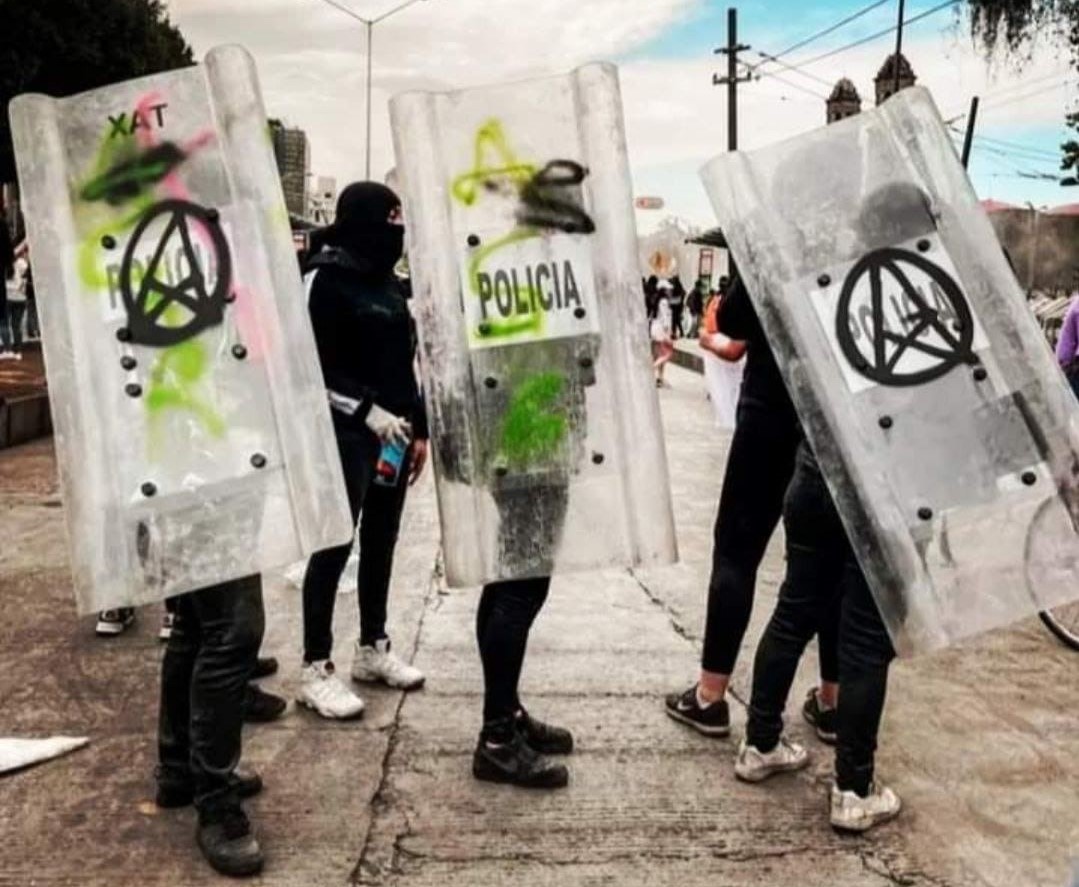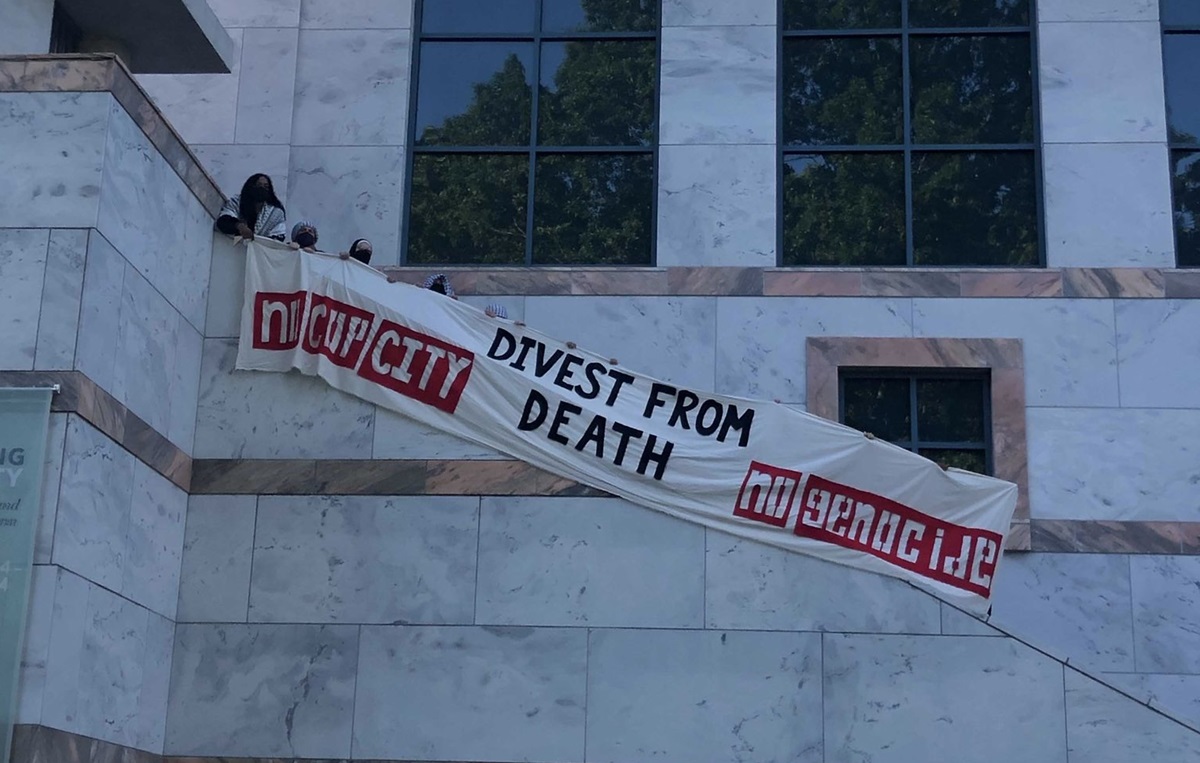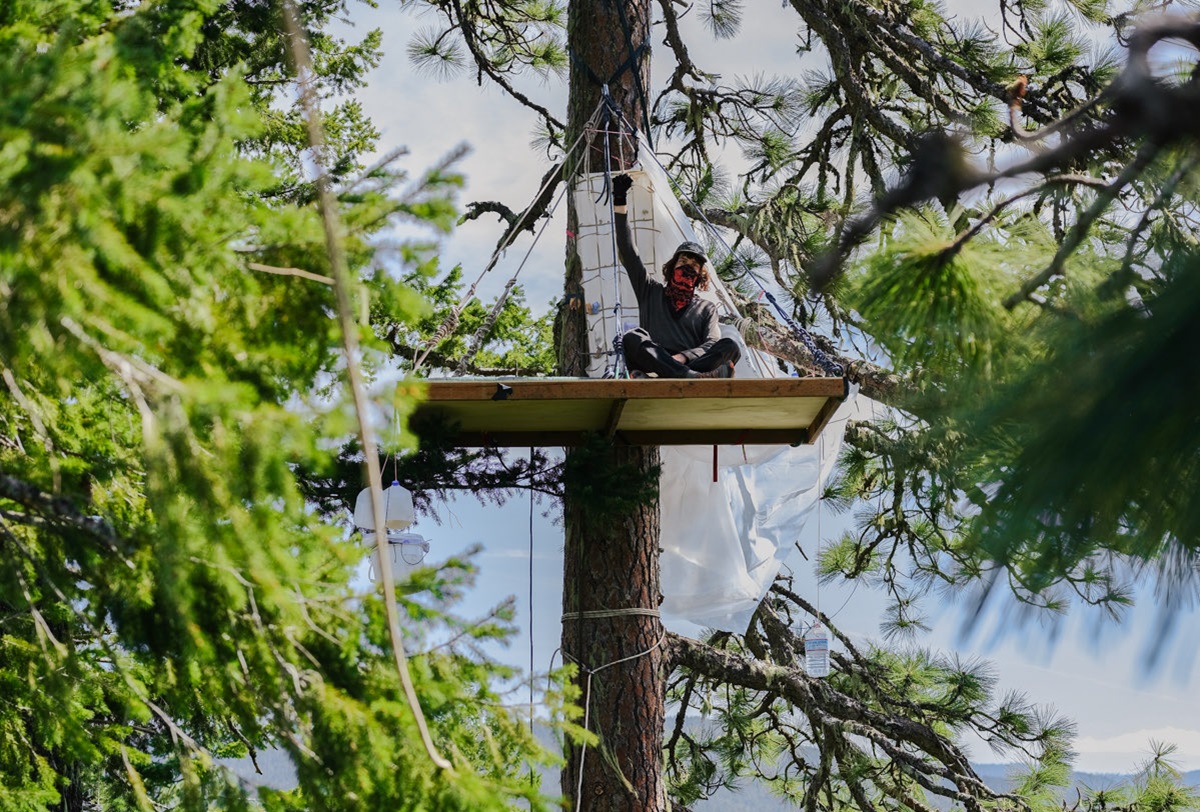Filed under: Featured, Interviews, Repression

Five months have passed since the start of the George Floyd rebellion, and hundreds are facing trumped up charges and heavy prison time. In this context, FBI contact and so-called “door knocks,” when FBI agents visit people’s home or those of their loved ones, has increased.
Over 10,000 ppl have been arrested and around 75 currently have federal charges, which carry extensive prison sentences. The FBI is also visiting activists asking if they are involved in “antifa” while some are even propositioned with becoming informants.https://t.co/deoYJH0djt
— cℓaudia stєℓℓ✰r ✂️ (@ClaudiaStellar) June 23, 2020
Following up on our previous interview with our legal correspondent about what we can learn about the State’s emerging strategy of repression so far, we now look specifically at FBI door knocks and how they fit into a wider pattern of counter-insurgency.
With the State ramping up its efforts in the face of potential post-election unrest, its important that social movements build robust and collective responses to repression and normalize a culture of refusal of speaking and working with State authorities.
IGD: In the lead up to the election there have been reports of increased door knocks from the FBI. What use does the FBI have in door knocking? Why this tactic when seemingly they have other avenues of surveillance?
This is a pretty old tactic. I remember a lot of this back in the days of big protests against political conventions and trade summits. The FBI would do a bunch of door knocking in the weeks leading up to the protests. The upcoming election provides a similar situation.
People often say that there are two kinds of surveillance: the surveillance we know about and the surveillance we don’t know about. The latter is primarily for gathering information, whereas the former is more useful for the psychological impact. Like all dichotomies this one is flawed, but is useful for thinking about how we respond to and internalize surveillance.
FBI visits are scary and stressful and disruptive, especially if they visit you at work or go to a family member’s house. Some people will take fewer risks if they believe the feds are watching. Some might step away from their movements or political communities altogether, either temporarily or permanently. Sometimes people get paranoid, not just about the FBI but about who around them might be careless or malicious and talk. All this can have a serious chilling effect on movement activity.
Check out the new IGD podcast on repression and surveillance with Lauren Regan from the Civil Liberties Defense Center. @CLDChttps://t.co/qTPZKBYWzf
— Certain Days (@CertainDays) August 11, 2019
There’s a reason for this: they want us to believe we are under surveillance. They want us to be paranoid and afraid. They want us to police ourselves. But there is also an intelligence gathering purpose for door knocks. Unfortunately, despite all our efforts, sometimes people talk to the FBI. The FBI can be very convincing, using threats, manipulation, lies, common cause, sympathy, etc., to convince people to talk. And they are very accustomed to having people talk to them. A significant number of the uprising cases currently being prosecuted by the feds involve people who allegedly gave incriminating statements to the FBI after they were arrested and told they have the right to remain silent and to an attorney.
The FBI has a few goals when talking to people. Sometimes they want specific information about a specific crime. It might even be information they already know and just want to hear you say it so they can hang you with it later. Other times they are just gathering general intelligence about movements, stuff they can use as background or leads for other investigations, vulnerabilities they can exploit, key points they can target. Creating social maps of people’s relationships and dynamics is extremely useful in campaigns of repression. The more they know – the more effective they are.
Even when people don’t talk to the FBI, they are still gathering intelligence. Who seemed confident and who seemed scared? Who lawyers up and who doesn’t? Who publicizes the visit and who doesn’t? What did they see in your house from the front window or in the split second you opened the door before you realized it was the FBI? (Pro tip: FBI agents often don’t wear suits; it’s a lot more polo shirts and khakis, jeans, or cargo pants).
So for all these reason, door knocks are very useful for the feds.
IGD: If the FBI comes to your house and knock on your door, what should you do and not do?
Most importantly do NOT let them in and do NOT answer questions or talk to them! There’s a lot of resources out there, some of which get into a lot of detail, so I’ll just cover the basics here.
First, you are not required to answer the door (but if they are serving a warrant and you don’t answer they will kick your door in).
They might threaten you, intimidate you, lie to you, pretend to be your friend or want to help, tell you your friends already snitched, show you incriminating evidence, show you exculpatory evidence, literally anything under the sun that they think might get you to talk. They might even physically abuse you. But it’s very important that the only words that ever leave your lips are: “I am not going to answer questions. I want to speak to a lawyer.” You can’t talk your way out of trouble but you can talk your way into a lot trouble.
If they ask to search or “take a look” in your house, car, trunk, backpack, shed, purse, pocket, wallet, or anything else, say “No, I do not consent to a search.” Repeat as necessary.
If they have a warrant, you can ask to see it and inspect it (like in those ACLU Know Your Rights trainings), but in all likelihood, they probably already have you in handcuffs with a couple guns pointed at you and are yelling commands. So mostly try to just stay cool and get your wits about you and say, “I am not going to answer questions. I want to speak to a lawyer.” If they serve you a subpoena, take it. Listen to whatever they have to say (or don’t! you’re not required to talk OR listen!). Wait for them to leave and then go back inside and lawyer up.
A nearby chapter of the National Lawyers Guild or a local anti-repression group might be able to help you find a lawyer. If that doesn’t exist where you are, you can review local attorney websites to see who seems more social justice oriented, or just start calling around and asking.
I recommend never physically resisting or interfering in any way, because it will likely just make your situation worse. Just say over and over, “I am not going to answer questions. I want to speak to a lawyer. I do not consent to a search.”
Also, don’t keep the visit a secret. I recommend being at least semi-public about it. If people find out you got visited and didn’t tell anyone, they will be suspicious of you. People also need to know so they can prepare and protect themselves. Perhaps there’s information you all can gain from connecting the dots about the FBI’s investigation. Their investigations thrive in secrecy, darkness, and isolation. Our weapons are solidarity, transparency, and support, but we can’t do that if people keep these things to themselves.
IGD: What about on the street?
The first thing you should ask if contacted by any law enforcement on the street is, “Am I free to go?” Sometimes it will be obvious that you are not free to go because they’ve grabbed you or worse. But if there is ever any question, ask “Am I free to go?” Often they will not want to answer. They will say something like “I just was talk to you,” or “I’m just trying find out what’s going on here.” Repeat yourself: “Am I free to go?” Repeat it as many times as you need to. If they every say yes, that you are free to go, JUST LEAVE. Not another word, not another second, just leave!
If they say no, or just refuse to answer but you suspect you will get tackled if you try to leave, then you are detained. Now it’s time to say “I am not going to answer questions. I want to speak to a lawyer.”
If they want to pat you down, or “take a look” in your belongings say,“No, I do not consent to a search.” Say it loud and proud and repeat as often as necessary. But I recommend not physically resisting because it likely won’t make them stop, and will likely make your situation worse.
IGD: What happens if they confront you in jail or where you work?
Well, I’m going to sound like a broken record here, but the only thing you should say is “I am going to remain silent. I want a lawyer.” If you remember nothing else from today, remember those two short sentences.
Jail and work are possibly the two most challenging places to encounter the FBI. In jail you are isolated, depressed, confined, afraid of more time in there, and looking for any way out. At work you are worried what other people are thinking, caught off guard as you were focusing on your job (but hopefully not focusing too hard!), and scared of gettig fired. These are all vulnerabilities that the FBI will try to exploit to get you to talk and cooperate. It’s a good idea to think ahead about how you will guard against those attempts.
To the extent that you can, talking to coworkers or supervisors ahead of time can be extremely helpful (same goes for family, friends, and roommates). You don’t want these people to talk to the FBI out of ignorance or carelessness. And you want to lessen the impact of when/if the FBI does show up, giving them context to understand it and getting a head start on shaping the narrative. Will your coworkers see the FBI is noble helpers, or thuggish interlopers? Union organizers call this inoculation, which feels especially apt during this pandemic.
Even if you can’t talk to everyone about it before it happens, have a couple coworkers that will help stick up for you could be invaluable to blunt the shock and anger from your boss when the FBI shows up.
Obviously, this is easier said than done and many people opt to take their chances and not say anything until after the FBI shows up. If you choose this route, hopefully you have a good explanation, a tolerant boss, or just don’t care too much about that job.
IGD: Such things are rare, but what should people do if they are picked up by unmarked individuals such as what happened in Portland?
This is tricky and somewhat uncharted territory in the modern era of the US. In the past it has been reasonably safe to at least assume that you are being kidnapped by the government. But now, while still unlikely I think, it’s not completely outside the realm of possibility that you are actually being kidnapped by some non-state right-wing group that looks indistinguishable from paramilitary law enforcement.
My first advice is to not panic. This is easier said than done, but you will need to make some very quick decisions that could have literal life or death consequences. Initially you need to make the best assessment you can about who is grabbing you: is it law enforcement, or non-state fascists? You also need to assess the possibility of escape, which could depend on any number of factors from how many people are grabbing you, whether there is a sympathetic crowd around, and your own physical abilities.
If you think you are getting grabbed by law enforcement, I recommend not physically resisting or trying to escape. The state has vast resources to pursue you and generally the consequence of an unsuccessful escape attempt will be a lot worse than if you just surrender. But people should make their own decisions about that according to their circumstances.
If you believe you are getting kidnapped by fascists, I recommend doing anything you can to resist and escape. It’s hard to imagine for what purpose they are kidnapping you, but it’s not going to be good and this is probably your best opportunity to escape. Resisting and escaping a kidnapping are pretty well outside of my knowledge base though, so you should do your own research if this is something you are thinking about. And hopefully your assessment about who is kidnapping you is correct.
Many or even most people are going to assume they’ve been grabbed by law enforcement and that they should go peacefully. In that case, don’t physically resist, but make as much noise as you can. Get someone’s attention. Hopefully it’s someone friendly. Give them your legal name and date of birth and get them to take photo or video. This will be important for helping find you later. If you are witness to anything like this happening, do everything you can to document it with photos, videos, or notes. Get as much info from the arrestee as is reasonably safe, and document as much as you can about the paramilitaries. Then get in touch with legal support.
Assuming you’ve been grabbed by some type of police, they will take you to some government facility like a police station, jail, court house, federal building, etc. At this point there isn’t much you can do but invoke your rights and wait it out. The only thing you should say under any circumstances is “I am going to remain silent. I want a lawyer.” They will use your shock and fear and confusion against you. They will try to catch you with your guard down to start a conversation. They will promise you freedom and ten thousand other things if you just answer their questions. They will threaten you with prison and ten thousand different things if you don’t talk. Everything they tell you is a lie.
The only thing you should say, the only thing that can help you is “I am going to remain silent. I want a lawyer.”
IGD: There’s a lot of talk in the media about potential violence from the far-Right and civil war type scenarios. What are your thoughts?
There’s no election scenario in which a significant portion of the country won’t see the results as wholly illegitimate. But which way does this illegitimacy slant, how heavily, and how do people act on it are all open questions. I think the prospects of a full scale “hot” civil war breaking out are pretty low. I think it’s more likely that we will see pockets of conflict and escalation in various places based on the conditions and sequence of events there. I think events in Portland have modeled a lot of what we can expect in the near future, both the positive and the negative. We’ve seen it happen in Kenosha. As I write this, the National Guard is being mobilized to go to Philly for the Walter Wallace uprising there.
A lot of people have written much more thorough explorations of this topic and I encourage you to read as many of them as you can stomach:
- The one thing we can be sure of, regardless of election outcomes, is more state repression. Over 300 people are facing federal charges from the uprisings so far, and every week brings more cases. Thousands of State and local cases are pending. The more people can anticipate this in their organizing and actions, the more we can exchange security and anti-repression knowledge and tips across communities and movements, the more we can take care of the people facing the brunt of the repression the more resilient all of us become.
The future looks ominous for sure. But I also believe we have the knowledge, the skills, and the love and care for one another to survive and to keep fighting.




